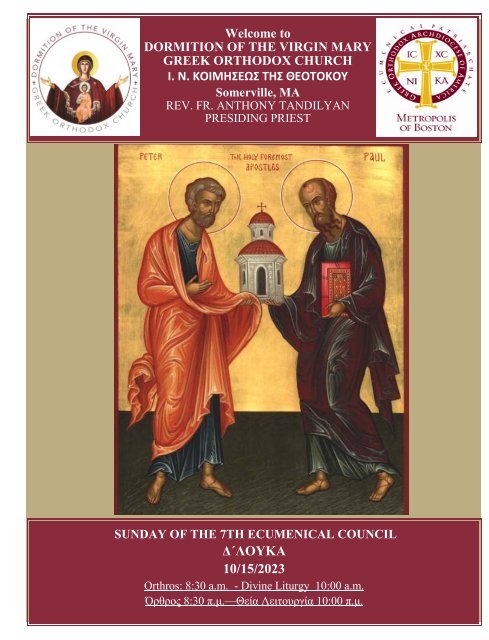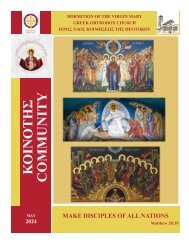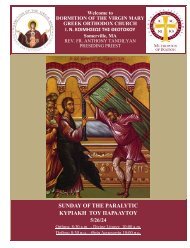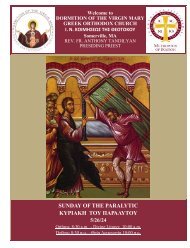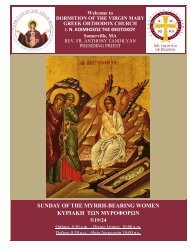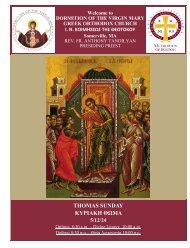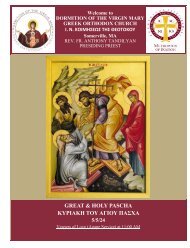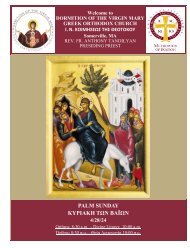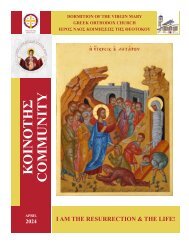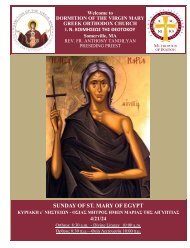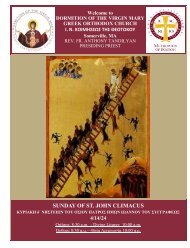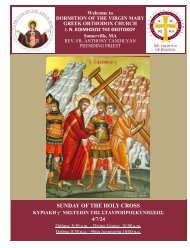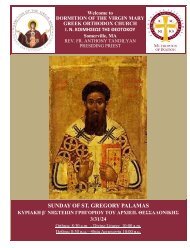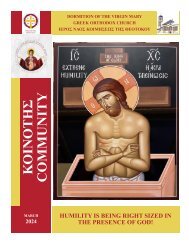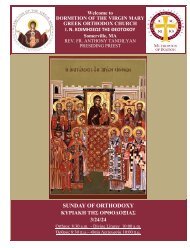Create successful ePaper yourself
Turn your PDF publications into a flip-book with our unique Google optimized e-Paper software.
Welcome to<br />
DORMITION OF THE VIRGIN MARY<br />
GREEK ORTHODOX CHURCH<br />
Ι. Ν. ΚΟΙΜΗΣΕΩΣ ΤΗΣ ΘΕΟΤΟΚΟΥ<br />
Somerville, MA<br />
REV. FR. ANTHONY TANDILYAN<br />
PRESIDING PRIEST<br />
SUNDAY OF THE 7TH ECUMENICAL COUNCIL<br />
Δ΄ΛΟΥΚΑ<br />
10/<strong>15</strong>/<strong>2023</strong><br />
Orthros: 8:30 a.m. - Divine Liturgy 10:00 a.m.<br />
Όρθρος 8:30 π.μ.—Θεία Λειτουργία 10:00 π.μ.
TROPARIA SUNG AFTER THE<br />
ENTRANCE OF THE HOLY GOSPEL<br />
Resurrectional Apolytikion<br />
When You descended unto Death, O Lord,<br />
You who are immortal Life put Hades to<br />
death, by the lightning of Your divinity.<br />
And when You raised the dead from the<br />
netherworld, all the hosts of heaven sang<br />
aloud to You, "O Christ God, Giver of life,<br />
glory to You!"<br />
For the Fathers<br />
Supremely blessed are You, O Christ our God. You<br />
established the holy Fathers upon the earth as beacons,<br />
and through them You have guided us all to the<br />
true Faith, O greatly merciful One, glory be to You.<br />
Apolytikion of St. Catherine<br />
Let us praise the most auspicious bride of<br />
Christ, the divine Katherine, protectress of Sinai,<br />
our aid and our help. For, she brilliantly<br />
silenced the eloquence of the impious by the<br />
sword of the spirit, and now, crowned as a martyr,<br />
she asks great mercy for all.<br />
Apolytikion of the Church<br />
Ιn giving birth, you did preserve your virginity;<br />
in your dormition you did not forsake<br />
the world O Theotokos. You were<br />
translated onto life, since you were the<br />
Mother of life; And by your intercessions do<br />
you redeem our souls from death.<br />
Kontakion<br />
O Protection of Christians that never falls,<br />
intercession with the Creator that never<br />
fails, we sinners beg you, do not ignore the<br />
voices of our prayers. O good Lady, we implore<br />
you, quickly come unto our aid, when<br />
we cry out to you with faith. Hurry to intercession,<br />
and hasten to supplication, O Theotokos<br />
who protect now and ever those who<br />
honor you.<br />
ΤΡΟΠΑΡΙΑ ΨΑΛΛΟΜΕΝΑ ΜΕΤΑ ΤΗΝ<br />
ΕΙΣΟΔΟ ΤΟΥ ΕΥΑΓΓΕΛΙΟΥ<br />
Αναστάσιμον Απολυτίκιον<br />
Ὅτε κατῆλθες πρὸς τὸν θάνατον, ἡ ζωὴ ἡ<br />
ἀθάνατος, τότε τὸν ᾅδην ἐνέκρωσας, τῇ<br />
ἀστραπῇ τῆς θεότητος· ὅτε δὲ καὶ τοὺς<br />
τεθνεῶτας, ἐκ τῶν καταχθονίων<br />
ἀνέστησας, πᾶσαι αἱ δυνάμεις τῶν<br />
ἐπουρανίων ἐκραύγαζον· Ζωοδότα<br />
Χριστέ, ὁ Θεὸς ἡμῶν δόξα σοι.<br />
Των Πατέρων<br />
Ὑπερδεδοξασμένος εἶ, Χριστὲ ὁ Θεὸς ἡμῶν, ὁ<br />
φωστῆρας ἐπὶ γῆς τοὺς Πατέρας ἡμῶν<br />
θεμελιώσας, καὶ διʼ αὐτῶν πρὸς τὴν ἀληθινὴν<br />
πίστιν, πάντας ἡμᾶς ὁδηγήσας·<br />
πολυεύσπλαγχνε, δόξα σοι.<br />
Απολυτίκιον της Αγίας Αικατερίνης<br />
Τήν πανεύφημον νύμφην Χριστού<br />
υμνήσωμεν, Αικατερίναν τήν θείαν καί<br />
πολιούχον Σινά, τήν βοήθειαν ημών καί<br />
αντίληψιν, ότι εφίμωσε λαμπρώς, τούς<br />
κομψούς τών ασεβών, τού Πνεύματος τή<br />
μαχαίρα, καί νύν ως Μάρτυς στεφθείσα,<br />
αιτείται πάσι τό μέγα έλεος.<br />
Απολυτίκιον του Ναού<br />
Εν τη γεννήσει την παρθενίαν εφύλαξας, εν τη<br />
κοιμήσει τον κόσμον ου κατέλιπες, Θεοτόκε.<br />
μετέστης προς την ζωήν, Μήτηρ υπάρχουσα<br />
της ψυχής και ταις πρεσβείαις ταις σαις<br />
λυτρουμένη εκ θανάτου τας ψυχάς ημών.<br />
Κοντάκιον<br />
Προστασία τῶν Χριστιανῶν ἀκαταίσχυντε,<br />
μεσιτεία, πρὸς τὸν Ποιητὴν ἀμετάθετε, μὴ<br />
παρίδῃς, ἁμαρτωλῶν δεήσεων φωνάς, ἀλλὰ<br />
πρόφθασον, ὡς ἀγαθή, εἰς τὴν βοήθειαν ἡμῶν,<br />
τῶν πιστῶς κραυγαζόντων σοι· Τάχυνον εἰς<br />
πρεσβείαν, καὶ σπεῦσον εἰς ἱκεσίαν, ἡ<br />
προστατεύουσα ἀεί, Θεοτόκε, τῶν τιμώντων<br />
σε.
EPISTLE READING<br />
TITUS (3:8-<strong>15</strong>)<br />
Titus, my son, the saying is sure. I desire<br />
you to insist on these things, so that those<br />
who have believed in God may be careful to<br />
apply themselves to good deeds; these are<br />
excellent and profitable to men. But avoid<br />
stupid controversies, genealogies, dissensions,<br />
and quarrels over the law, for they are<br />
unprofitable and futile. As for a man who is<br />
factious, after admonishing him once or<br />
twice, have nothing more to do with him,<br />
knowing that such a person is perverted and<br />
sinful; he is self-condemned.<br />
When I send Artemas or Tychicos to you, do<br />
your best to come to me at Nicopolis, for I<br />
have decided to spend the winter there. Do<br />
your best to speed Zenas the lawyer and<br />
Apollos on their way; see that they lack<br />
nothing. And let our people learn to apply<br />
themselves to good deeds, so as to help cases<br />
of urgent need, and not to be unfruitful.<br />
All who are with me send greeting to you.<br />
Greet those who love us in the faith. Grace<br />
be with you all. Amen.<br />
ΑΠΟΣΤΟΛΙΚΗ ΠΕΡΙΚΟΠΗ<br />
ΠΡΟΣ ΤΙΤΟΝ (3:8-<strong>15</strong>)<br />
Τέκνον Τίτε, πιστὸς ὁ λόγος, καὶ περὶ<br />
τούτων βούλομαί σε διαβεβαιοῦσθαι, ἵνα<br />
φροντίζωσιν καλῶν ἔργων προΐστασθαι οἱ<br />
πεπιστευκότες θεῷ. ταῦτά ἐστιν καλὰ καὶ<br />
ὠφέλιμα τοῖς ἀνθρώποις · μωρὰς δὲ<br />
ζητήσεις καὶ γενεαλογίας καὶ ἔριν καὶ<br />
μάχας νομικὰς περιΐστασο, εἰσὶν γὰρ<br />
ἀνωφελεῖς καὶ μάταιοι. αιῥετικὸν<br />
ἄνθρωπον μετὰ μίαν καὶ δευτέραν<br />
νουθεσίαν παραιτοῦ, εἰδὼς ὅτι ἐξέστραπται<br />
ὁ τοιοῦτος καὶ ἁμαρτάνει, ὢν<br />
αὐτοκατάκριτος. Ὅταν πέμψω Ἀρτεμᾶν<br />
πρὸς σὲ ἢ Τυχικόν, σπούδασον ἐλθεῖν πρός<br />
με εἰς Νικόπολιν, ἐκεῖ γὰρ κέκρικα<br />
παραχειμάσαι. Ζηνᾶν τὸν νομικὸν καὶ<br />
Ἀπολλῶν σπουδαίως πρόπεμψον, ἵνα μηδὲν<br />
αὐτοῖς λείπῃ. μανθανέτωσαν δὲ καὶ οἱ<br />
ἡμέτεροι καλῶν ἔργων προΐστασθαι εἰς τὰς<br />
ἀναγκαίας χρείας, ἵνα μὴ ὦσιν ἄκαρποι.<br />
Ἀσπάζονταί σε οἱ μετ ᾽ἐμοῦ πάντες.<br />
Ἄσπασαι τοὺς φιλοῦντας ἡμᾶς ἐν πίστει. ἡ<br />
χάρις μετὰ πάντων ὑμῶν.<br />
PARISH COUNCIL MEMBERS SERVING TODAY<br />
Evangelos Kechris, Nick Lamb & Katerina Leventis<br />
ΜΕΛΟI ΤΟΥ ΕΚΚΛΗΣΙΑΣΤΙΚΟΥ ΣΥΜΒΟΥΛΙΟΥ<br />
ΥΠΕΥΘΥΝΟI ΣΗΜΕΡΑ<br />
Ευάγγελος Κεχρής, Νίκος Λαμπ & Κατερίνα Λεβέντης
GOSPEL READING<br />
LUKE (8:5-<strong>15</strong>)<br />
The Lord said this parable: "A sower went out to sow his seed;<br />
and as he sowed, some fell along the path, and was trodden under<br />
foot, and the birds of the air devoured it. And some fell on the<br />
rock; and as it grew up, it withered away, because it had no moisture.<br />
And some fell among thorns; and the thorns grew with it<br />
and choked it. And some fell into good soil and grew, and yielded<br />
a hundredfold." And when his disciples asked him what this parable meant, he said,<br />
"To you it has been given to know the secrets of the kingdom of God; but for others they<br />
are in parables, so that seeing they may not see, and hearing they may not understand.<br />
Now the parable is this: The seed is the word of God. The ones along the path are those<br />
who have heard; then the devil comes and takes away the word from their hearts, that they<br />
may not believe and be saved. And the ones on the rock are those who, when they hear the<br />
word, receive it with joy; but these have no root, they believe for a while and in time of<br />
temptation fall away. And as for what fell among the thorns, they are those who hear, but<br />
as they go on their way they are choked by the cares and riches and pleasures of life, and<br />
their fruit does not mature. And as for that in the good soil, they are those who, hearing<br />
the word, hold it fast in an honest and good heart, and bring forth fruit with patience." As<br />
he said these things, he cried out "He who has ears to hear, let him hear."<br />
Today we commemorate:<br />
SAINTS<br />
Lucian the Martyr of Antioch<br />
Savinos the Bishop of Catania<br />
Barsus the Confessor<br />
Euthymios the New
ΕΥΑΓΓΕΛΙΚΗ ΠΕΡΙΚΟΠΗ<br />
ΚΑΤΑ ΛΟΥΚΑΝ (8:5-<strong>15</strong>)<br />
Εἶπεν ὁ Κύριος τήν παραβολὴν ταύτην· Ἐξῆλθεν ὁ σπείρων τοῦ<br />
σπεῖραι τὸν σπόρον αὐτοῦ. καὶ ἐν τῷ σπείρειν αὐτὸν ὃ μὲν ἔπεσε παρὰ<br />
τὴν ὁδόν, καὶ κατεπατήθη, καὶ τὰ πετεινὰ τοῦ οὐρανοῦ κατέφαγεν<br />
αὐτό· καὶ ἕτερον ἔπεσεν ἐπὶ τὴν πέτραν, καὶ φυὲν ἐξηράνθη διὰ τὸ μὴ<br />
ἔχειν ἰκμάδα· καὶ ἕτερον ἔπεσεν ἐν μέσῳ τῶν ἀκανθῶν, καὶ<br />
συμφυεῖσαι αἱ ἄκανθαι ἀπέπνιξαν αὐτό. καὶ ἕτερον ἔπεσεν εἰς τὴν γῆν<br />
τὴν ἀγαθήν, καὶ φυὲν ἐποίησε καρπὸν κατονταπλασίονα. ταῦτα λέγων ἐφώνει· ὁ ἔχων ὦτα<br />
ἀκούειν ἀκουέτω. ᾿Επηρώτων δὲ αὐτὸν οἱ μαθηταὶ αὐτοῦ λέγοντες· τίς εἴη ἡ παραβολὴ αὕτη; ὁ δὲ<br />
εἶπεν· ὑμῖν δέδοται γνῶναι τὰ μυστήρια τῆς βασιλείας τοῦ Θεοῦ, τοῖς δὲ λοιποῖς ἐν παραβολαῖς,<br />
ἵνα βλέποντες μὴ βλέπωσι καὶ ἀκούοντες μὴ συνιῶσιν. ἔστι δὲ αὕτη ἡ παραβολή· ὁ σπόρος ἐστὶν<br />
ὁ λόγος τοῦ Θεοῦ· οἱ δὲ παρὰ τὴν ὁδόν εἰσιν οἱ ἀκούσαντες, εἶτα ἔρχεται ὁ διάβολος καὶ αἴρει τὸν<br />
λόγον ἀπὸ τῆς καρδίας αὐτῶν, ἵνα μὴ πιστεύσαντες σωθῶσιν. οἱ δὲ ἐπὶ τῆς πέτρας οἳ ὅταν<br />
ἀκούσωσι, μετὰ χαρᾶς δέχονται τὸν λόγον, καὶ οὗτοι ῥίζαν οὐκ ἔχουσιν, οἳ πρὸς καιρὸν<br />
πιστεύουσι καὶ ἐν καιρῷ πειρασμοῦ ἀφίστανται. τὸ δὲ εἰς τὰς ἀκάνθας πεσόν, οὗτοί εἰσιν οἱ<br />
ἀκούσαντες, καὶ ὑπὸ μεριμνῶν καὶ πλούτου καὶ ἡδονῶν τοῦ βίου πορευόμενοι συμπνίγονται καὶ<br />
οὐ τελεσφοροῦσι. τὸ δὲ ἐν τῇ καλῇ γῇ, οὗτοί εἰσιν οἵτινες ἐν καρδίᾳ καλῇ καὶ ἀγαθῇ ἀκούσαντες<br />
τὸν λόγον κατέχουσι καὶ καρποφοροῦσιν ἐν ὑπομονῇ. ταῦτα λέγων ἐφώνει· ὁ ἔχων ὦτα ἀκούειν<br />
ἀκουέτω.<br />
ADDITIONAL SERVICES<br />
GREAT VESPERS - Saturday, October 21 at 6:00 PM<br />
ST. DEMETRIOS -Thursday, October 26 at 8:30 AM<br />
ΚΑΘΗΜΕΡΙΝΕΣ ΛΕΙΤΟΥΡΓΙΕΣ<br />
ΑΠΟΔΕΙΠΝΟΣ -Σάββατο, 21 Οκτωβρίου στις 6:00 μμ<br />
ΑΓΙΟΣ ΔΗΜΗΤΡΙΟΣ– Πέμπτη, 26 Οκτωβρίου στις 8:30 πμ
This week’s Sermon<br />
The Sower and the Seeds<br />
St. Luke 8 (5-<strong>15</strong>)<br />
Dear brothers and sisters in Christ,<br />
Today Our Lord and Savior Jesus Christ is teaching us about something<br />
that we experience in life every day. He tells us that the<br />
kingdom of God is like a sower that goes out and sows seeds. If you have ever sown seeds,<br />
you know how complex the process is. In the parable today Christ teaches us that the sower is<br />
God himself. So, the seeds are always spread every day everywhere. God is always calling us<br />
but today we would like to pay attention to the response that we give because the life of the<br />
seed depends on the environment where the seeds fall. The Lord talks about four kinds of<br />
places the seeds fall and only in one place out of four they grow and give fruit. Sometimes we<br />
think that the four environments are four different kinds of people, and we create divisions<br />
between what we call pious and impious people.<br />
Sometimes unfortunately the people who call themselves pious develop a judgmental<br />
mind towards those who seem to be not so pious. And people who think that they are not pious<br />
look at pious people with contempt. Both conditions are traps set for humans by the evil<br />
one himself. The evil one is full of hatred and sows the seeds of hatred next to the seeds of<br />
love planted by our Lord in our hearts. Resentment is crucial to the drift away from reality.<br />
Resentment is the method by which the seeds of dislike then the seeds of hatred then<br />
the seeds of revenge are planted. Everyone has the seeds of the Kingdom of God in their<br />
hearts planted by our Lord. It is up to us to either water them by love and make them grow or<br />
water them by resentments of our past grievances and delay the sprouting. Dear brothers and<br />
sisters in Christ by resentment and hatred we not only kill the seeds of the kingdom in other<br />
people but also in our own hearts. By love, kindness, and respect for humanity, we allow the<br />
life-giving water to flow towards our hearts where the seeds of the Kingdom wait patiently for<br />
our repentance.<br />
Then only then after we have flooded our hearts with love, we can help others from<br />
the overflowing love that comes from our hearts to improve the environment in which the<br />
seeds of the Kingdom wait for an opportune time to grow.<br />
Journey through the Daily Gospels<br />
Sunday Sermons
Κύρηγμα της εβδομάδας<br />
Αγαπητοί εν Χριστώ αδερφοί,<br />
Σήμερα ο Κύριος και ο Σωτήρας μας ο Ιησούς Χριστός μας<br />
διδάσκει για κάτι που βιώνουμε στη ζωή κάθε μέρα. Μας λέει<br />
ότι η βασιλεία του Θεού είναι σαν ένα γεωργό που βγαίνει και<br />
σπέρνει σπόρους. Εάν έχετε σπείρει ποτέ σπόρους, γνωρίζετε<br />
πόσο περίπλοκη είναι η διαδικασία. Στην παραβολή σήμερα ο Χριστός μας διδάσκει ότι ο<br />
γεωργός είναι ο ίδιος ο Θεός. Έτσι, οι σπόροι απλώνονται πάντα κάθε μέρα παντού. Ο<br />
Θεός μας καλεί πάντα, αλλά σήμερα θα θέλαμε να δώσουμε προσοχή στην ανταπόκριση<br />
που δίνουμε γιατί η ζωή του σπόρου εξαρτάται από το περιβάλλον όπου πέφτουν οι<br />
σπόροι. Ο Κύριος μιλά για τέσσερα είδη τόπων που πέφτουν οι σπόροι και μόνο σε ένα<br />
μέρος από τα τέσσερα μεγαλώνουν και δίνουν καρπούς. Μερικές φορές πιστεύουμε ότι<br />
τα τέσσερα περιβάλλοντα είναι τέσσερα διαφορετικά είδη ανθρώπων και δημιουργούμε<br />
διαιρέσεις μεταξύ αυτού που αποκαλούμε ευσεβείς και ασεβείς ανθρώπους.<br />
Μερικές φορές, δυστυχώς, οι άνθρωποι που αυτοαποκαλούνται ευσεβείς κρίνουν<br />
αυτούς που φαίνεται να μην είναι τόσο ευσεβείς. Και οι άνθρωποι που πιστεύουν ότι δεν<br />
είναι ευσεβείς βλέπουν τους ευσεβείς ανθρώπους με περιφρόνηση. Και οι δύο συνθήκες<br />
είναι οι παγίδες που ορίζονται για τον άνθρωπο από τον ίδιο το κακό. Το κακό είναι<br />
γεμάτο μίσος και σπέρνει τους σπόρους του μίσους δίπλα στους σπόρους της αγάπης που<br />
φυτεύτηκαν από τον ίδιο τον Κύριό μας. Η δυσαρέσκεια είναι ζωτικής σημασίας για την<br />
απομάκρυνση από την πραγματικότητα.<br />
Η μνησικακία είναι η μέθοδος με την οποία φυτεύονται οι σπόροι της<br />
δυσαρέσκειας, έπειτα οι σπόροι του μίσους και έπειτα οι σπόροι της εκδίκησης. Ο<br />
καθένας έχει τους σπόρους της Βασιλείας του Θεού στις καρδιές τους που φυτεύτηκαν<br />
από τον Κύριό μας. Εναπόκειται σε εμάς να τους ποτίζουμε με αγάπη και να τους<br />
κάνουμε να μεγαλώνουν ή να τους ποτίζουμε με δυσαρέσκεια των παρελθόντων μας και<br />
να καθυστερήσουμε τη βλάστηση. Αγαπητοί αδελφοί και αδελφές εν Χριστό, με<br />
δυσαρέσκεια και μίσος όχι μόνο σκοτώνουμε τους σπόρους του βασιλείου σε άλλους<br />
ανθρώπους αλλά και στις καρδιές μας. Με αγάπη, καλοσύνη και σεβασμό για την<br />
ανθρωπότητα, αφήνουμε το ζωογόνο νερό να ρέει προς τις καρδιές μας, όπου οι σπόροι<br />
της Βασιλείας περιμένουν υπομονετικά την μετάνοια μας.<br />
Τότε μόνο, αφού πλημμυρίσουμε τις καρδιές μας με αγάπη, μπορούμε να<br />
βοηθήσουμε τους άλλους από την υπερχείλιση της αγάπης από τις καρδιές μας να<br />
βελτιώσουν το περιβάλλον στο οποίο οι σπόροι του Βασιλείου περιμένουν έναν<br />
κατάλληλο χρόνο να αναπτυχθούν.
Loukianos the Martyr of Antioch<br />
The Hieromartyr Lucian, Presbyter of Antioch, was born in the Syrian<br />
city of Samosata. At twelve years of age he was left orphaned. Lucian<br />
distributed his possessions to the poor, and went to the city of Edessa to<br />
the confessor Macarius, under the guidance of whom he diligently read<br />
Holy Scripture and learned the ascetic life. For his pious and zealous<br />
spreading of Christianity among the Jews and pagans, Lucian was made a<br />
presbyter.<br />
In Antioch Saint Lucian opened a school where many students gathered.<br />
He taught them how to understand the Holy Scriptures, and how to live a<br />
virtuous life. Saint Lucian occupied himself with teaching, and he corrected<br />
the Greek text of the Septuagint, which had been corrupted in many places by copyists and<br />
by heretics who deliberately distorted it in order to support their false teachings. The entire<br />
Greek text of the Bible which he corrected was hidden in a wall at the time of his confession of<br />
Christ, and it was found during the lifetime of Saint Constantine the Great.<br />
During the persecution of Diocletian, Saint Lucian was arrested and was sent to prison in<br />
Nicomedia, where for nine years he encouraged other Christians with him to remain steadfast<br />
in their confession of Christ, urging them not to fear tortures or death.<br />
Saint Lucian died in prison from many terrible tortures and from hunger. Before his<br />
death, he wished to partake of the Holy Mysteries of Christ on the Feast of Theophany. Certain<br />
Christians who visited him brought bread and wine for the Eucharist. The hieromartyr, bound<br />
by chains and lying on a bed of sharp potsherds, was compelled to offer the Bloodless Sacrifice<br />
upon his chest, and all the Christians there in prison received Communion. The next day the<br />
emperor sent people to see if the saint was still alive. Saint Lucian said three times, “I am a<br />
Christian,” then surrendered his soul to God. The body of the holy martyr was thrown into the<br />
sea, but after thirty days dolphins brought it to shore. Believers reverently buried the body of<br />
the much-suffering Saint Lucian.<br />
Saint Lucian was originally commemorated on January 7, the day of his death. Later,<br />
when the celebration of the Synaxis of Saint John the Baptist was appointed for this day, the<br />
feast of Saint Lucian was transferred to October <strong>15</strong>.<br />
The October date may be associated with the dedication of a church which was built in<br />
Antioch by Saint Helen (May 21) over Saint Lucian’s holy relics.<br />
Although he was only a priest, sometimes Saint Lucian is depicted in the vestments of a<br />
bishop. The Stroganov Guide for Iconographers was published in Russia in 1869, based on a<br />
1606 manuscript. There Saint Lucian is depicted wearing a phelonion and holding a Gospel. He<br />
does not wear the omophorion of a bishop, however. Another handbook, the Litsevoy Podlinnik,<br />
states that Saint Lucian is to be depicted with the omophorion.<br />
It may be that the Russians thought of Saint Lucian as a bishop because of his importance<br />
to the Church, and so that is how they depicted him. Similarly, Saint Charalampus<br />
(February 10) is depicted as a priest in Greek icons, and as a bishop in Russian icons.
WELCOME<br />
We are glad you are here!<br />
We hope you find a warm welcome among us.<br />
Name(s):<br />
Phone:<br />
E-mail:<br />
Address:<br />
City:<br />
State:<br />
Zip:<br />
How May we serve you?<br />
□ Membership<br />
□ Sacrament<br />
□ House Blessing<br />
□ Hospital/Homebound Visit<br />
□ Please contact me.<br />
□ Note change of information<br />
Prayer Requests For:<br />
Comments:<br />
Helpful Hints<br />
Infants and children are always welcome<br />
in worship.<br />
A “wiggle room” is set up in the narthex<br />
for those little ones who need a bit more<br />
space and activity (you can still hear the<br />
service).<br />
Please silence your mobile devices during<br />
worship.<br />
Contribution<br />
Requestor:<br />
Fr. Anthony prays for all living and<br />
the departed during communion<br />
preparation.
Presiding Priest Fr. Anthony Tandilyan<br />
at your Service 24/7<br />
Προϊστάμενος π. Αντώνιος Ταντίλυαν<br />
Διαθέσιμος 24/7<br />
franthony@dormitionchurch.org<br />
978-223-8224<br />
Dormition of the Virgin Mary Greek Orthodox Church<br />
29 Central St., Somerville, MA 02143<br />
Tel: 617-625-2222—email: office@dormitionchurch.org


